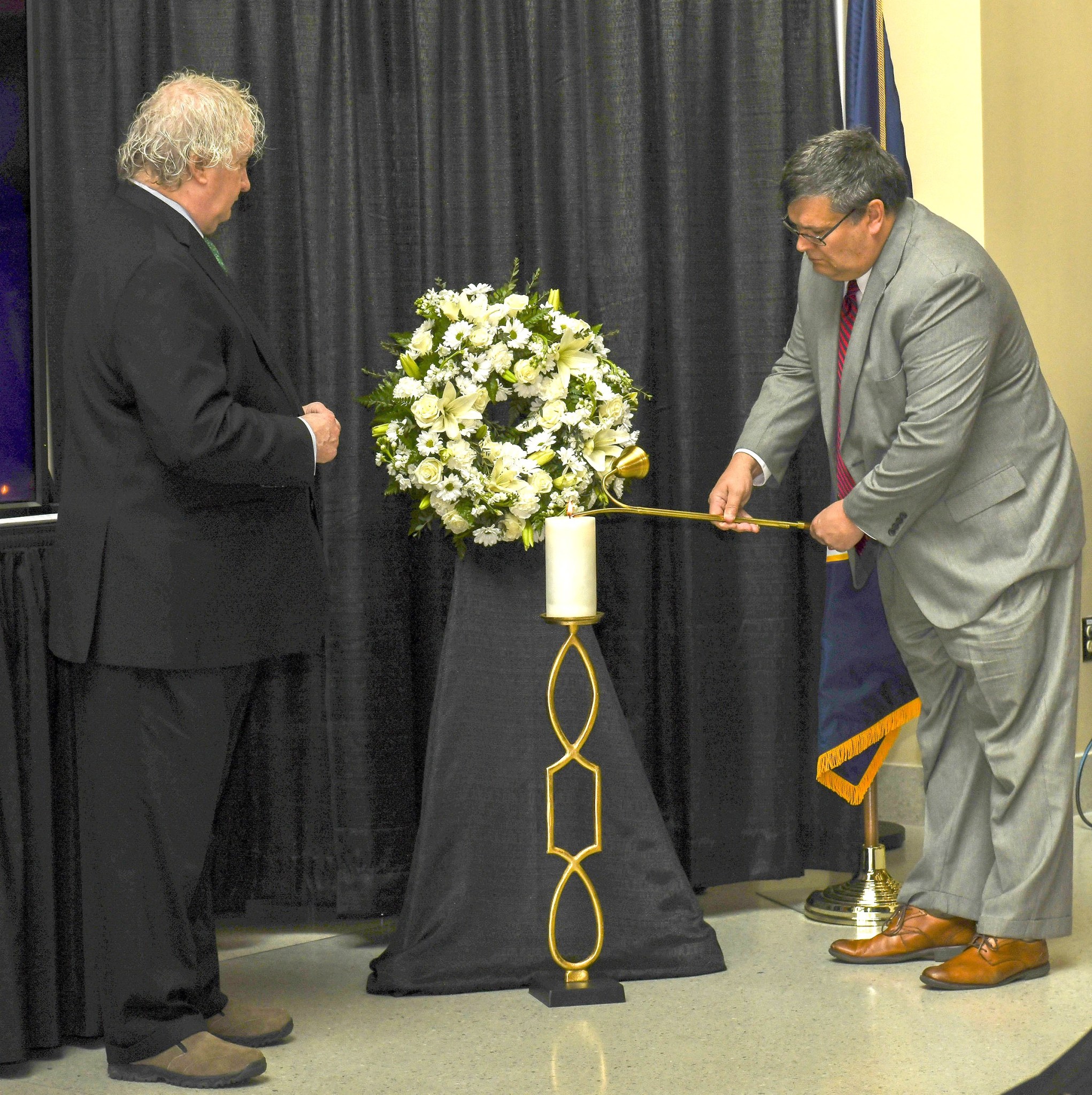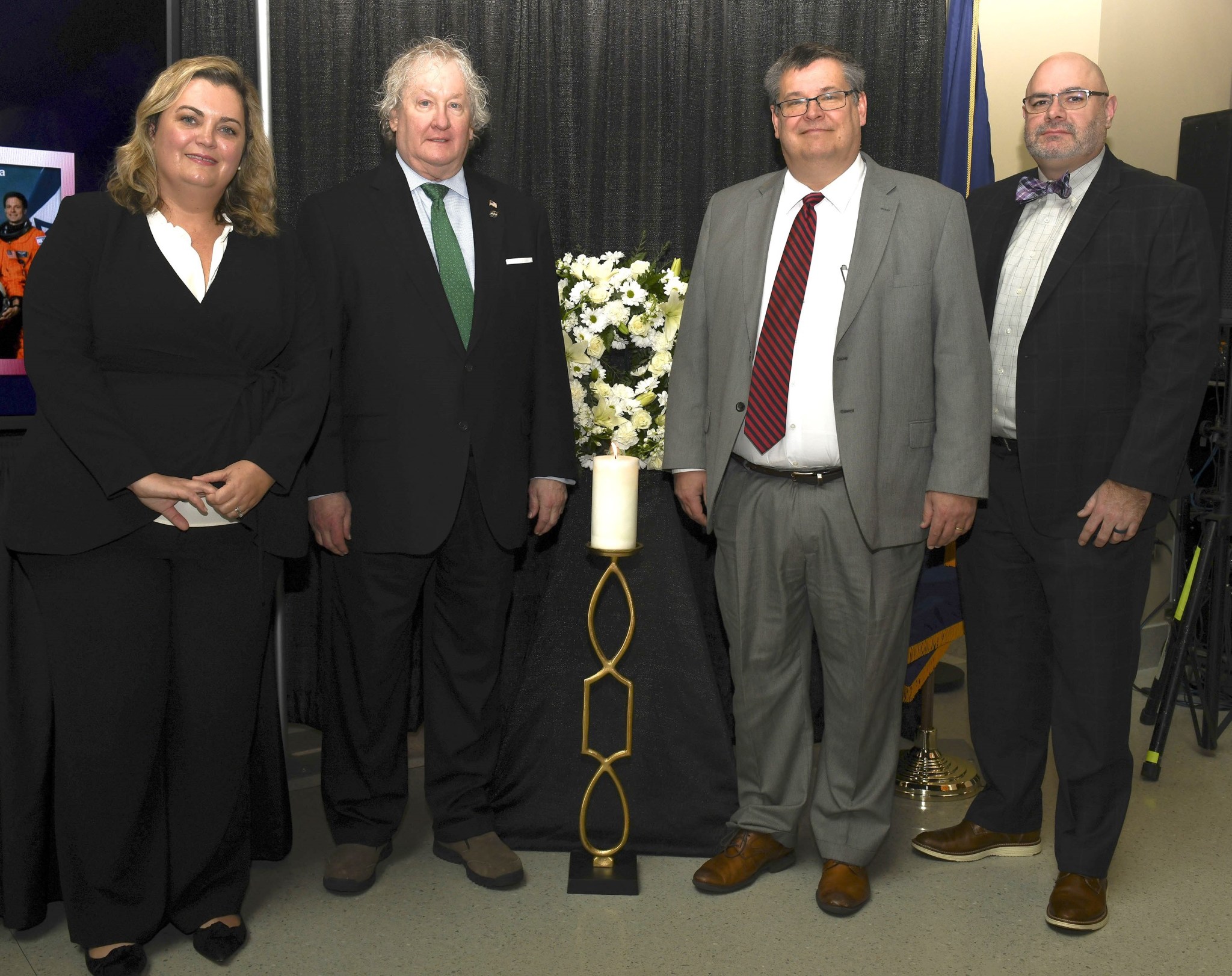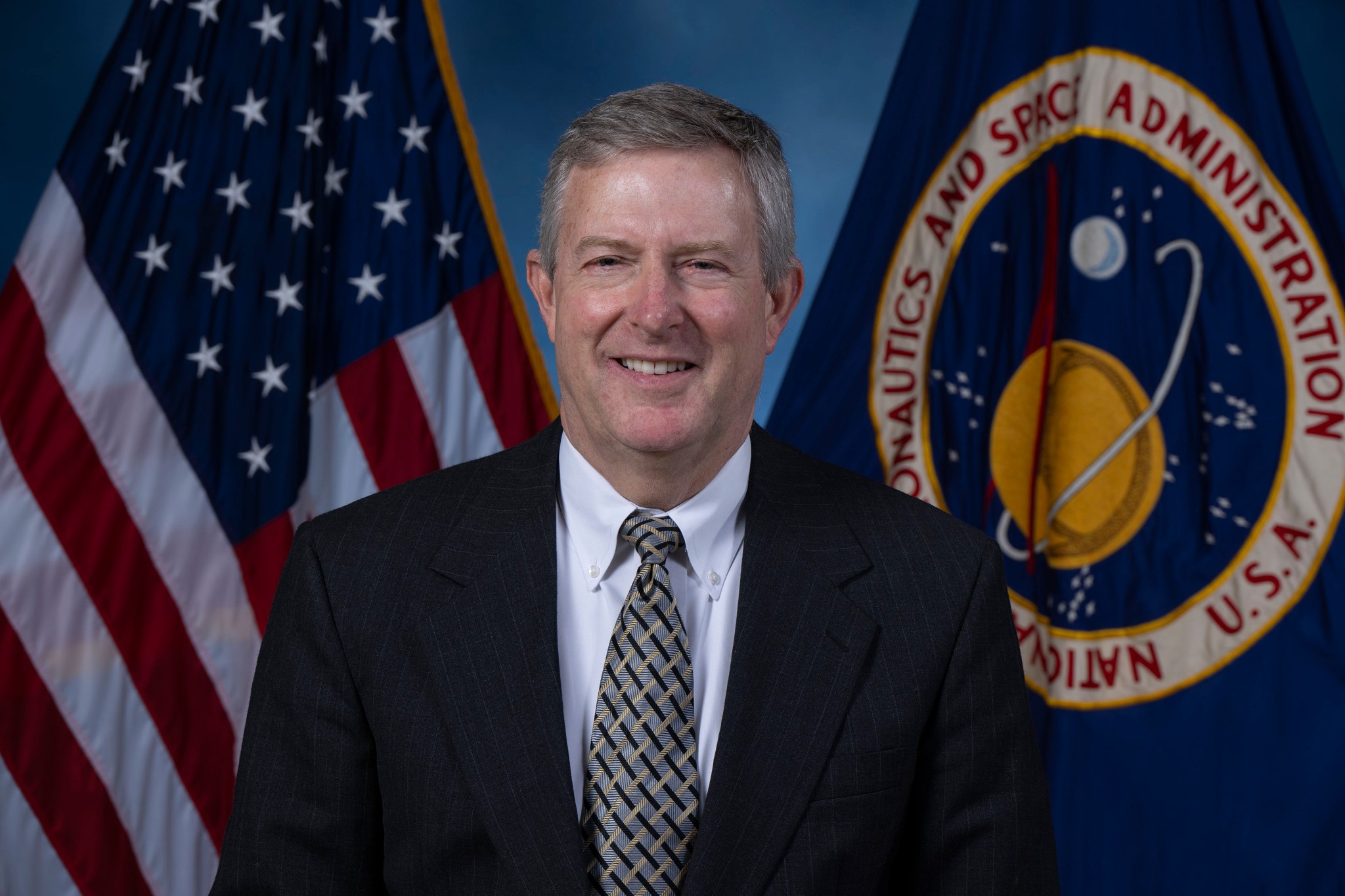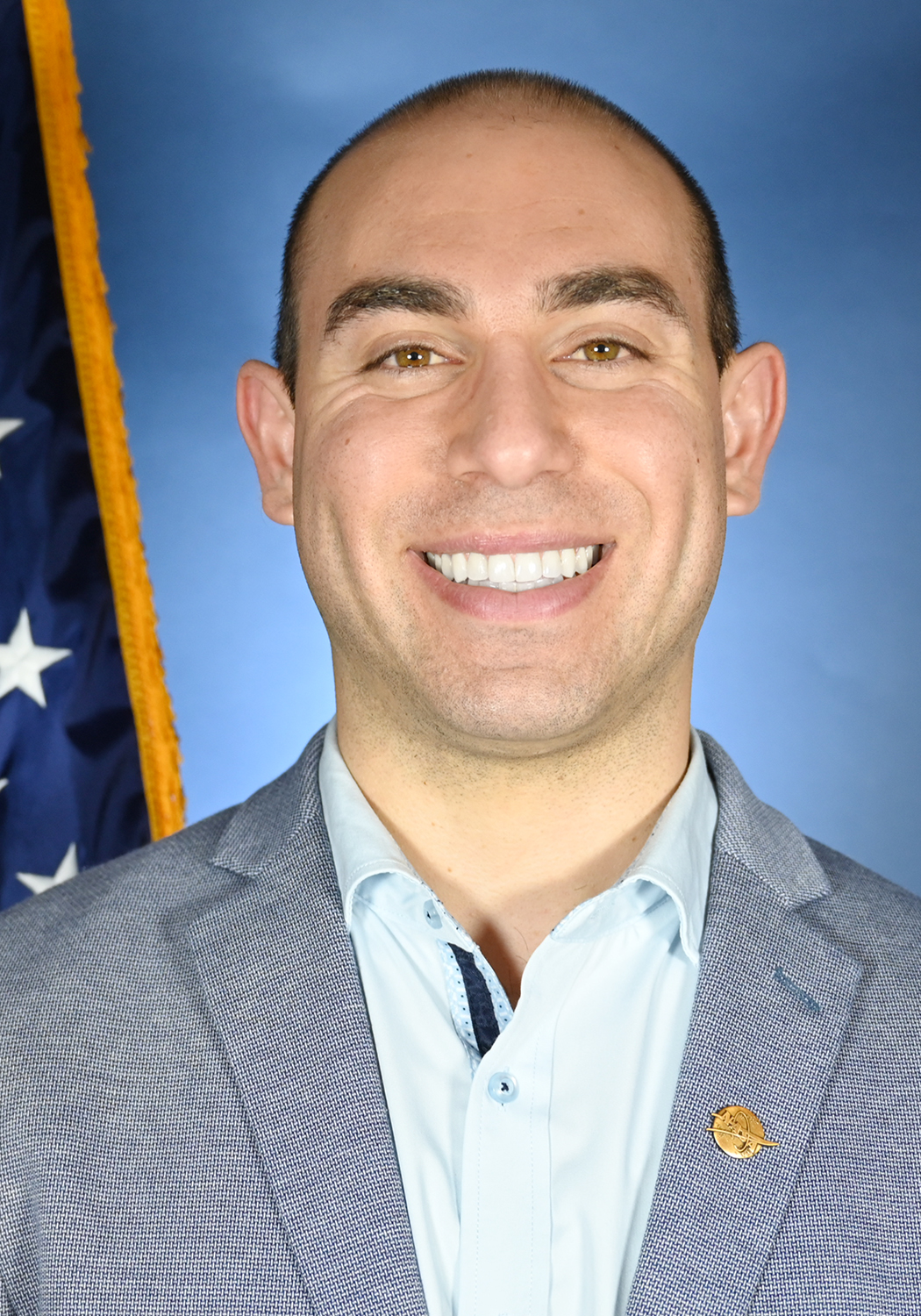
Marshall Commemorates NASA's Day of Remembrance
By Celine Smith
Team members across NASA's Marshall Space Flight Center congregated Jan. 25 in the lobby of Building 4221 to observe NASA's Day of Remembrance.
Each January, the agency pauses to honor members of the NASA family who lost their lives while furthering the cause of exploration and discovery, including the crews of Apollo 1 and space shuttles Challenger and Columbia.

The center's ceremony included speeches from Larry Leopard, Marshall associate director, technical, and Bill Hill, director of Marshall's Safety and Mission Assurance Directorate.
Leopard spoke about his memories of Challenger and Columbia's influence on his work ethic at Marshall.
"With every failure and loss, it is up to those who remain to learn and grow from those who have gone on before us to prevent the same mistakes as we push on to new heights," Leopard said.
Hill emphasized the importance of how a strong safety culture at Marshall is vital to mission success. He also encouraged Marshall team members to attend center safety workshops and complete training to eliminate as much risk as possible on future missions.

"Seventeen of our brave astronauts paid the ultimate price for our failures," Hill said. "Learning from our experience, we must become more humble, more dedicated to doing things right, more vigilant, questioning the process at every turn."
After their speeches, a candle was lit in memory of lives lost in the pursuit of exploration and discovery along with a moment of silence.
"The accidents we've had in the past are reminders of how hard, dangerous, and risky space exploration is," acting Center Director Joseph Pelfrey said afterward. "They serve as a reminder for us to be diligent at our jobs. As we bring younger generations into the workforce, we have to continue to teach them as well so that as a community we don't repeat these mistakes."
Smith, a Media Fusion employee, supports the Marshall Office of Communications.
National Mentoring Month: Troubleshooting with NASA's Aaron Comis and Brad Solomon
By Jessica Barnett
Mentorship is a valuable partnership that benefits both mentors and mentees. Like any relationship, it also comes with its fair share of challenges.
Those challenges can include misaligned expectations, miscommunications, time constraints, lack of engagement, and burnout. Overcoming those challenges is possible, but it takes commitment, communication, and flexibility from both parties.

Those concepts are all too familiar to Brad Solomon and Aaron Comis, who were paired as mentor and mentee respectively. Solomon, who currently serves as chief information officer for NASA's Marshall Space Flight Center, said he signed up for the systems engineering mentoring program and was purposefully paired with Comis, a former Pathways intern from Johnson Space Center who now works as chief digital engineer at Goddard Space Flight Center.
"We found we had more in common than we knew, as both of us were involved in the digital transformation initiative led by Jill Marlowe, and that our challenges at Marshall and Goddard in that effort were very common," Solomon said.

Being at different NASA centers meant the potential for additional challenges, but it also provided additional perspective and opportunities for the pair during their mentorship journey. As NASA wraps up its celebration of this year's Mentoring Month, Comis and Solomon sat down to offer their insight into how mentorship has influenced their lives and careers, as well as their tips for helping things go right and their advice for when things go wrong.
Question: What does mentorship mean to you?
Comis: To me, mentorship is a judgment-free relationship between peers that provides a safe space to discuss life with a focus on relating conversation back to a specific topic, whether it be professional, educational, personal, etc. We all eat, sleep, win, lose, and face challenges. The only constant is everything relating back to life.
Solomon: As a mentor, it means inspiring and helping create the next generation of leaders who will carry on the NASA legacy. I was fortunate to be part of the construction of ISS (International Space Station) and the Space Shuttle Program support, but the days of major NASA programs at the heart of the NASA mission are largely over, given the growth of the commercial space sector. More than ever, we need an innovative workforce adept at modern engineering techniques. With over 700 new NASA employees at Marshall since the pandemic began, all of us should feel obligated to help launch their young careers.
Question: What impact has mentorship had on you and your career?
Comis: Mentors have played a huge, albeit unassuming, role throughout my career, as early as my time at Johnson Space Center as a Pathways intern. My mentors throughout the years have provided me with a safe space to ask questions that I wasn't comfortable with asking publicly, supported me through hard times, and celebrated big wins with me. I honestly believe my career wouldn't be as successful or fun without the many mentors who helped me along the way.
Solomon: We all can look back at our careers and see the handful of leaders and conversations that changed the trajectory and propelled our careers. I had the privilege of being part of a Boeing program in the early 1990s that provided excellent leadership training and the opportunity to hear from aerospace leaders. Jonathan Pettus and Neil Rodgers instilled project management discipline and tireless work ethics in the implementation of NASA's first enterprise financial management systems. Being part of an enterprise IT source evaluation board gave me opportunities to work with leaders like Byron Butler and Walt Melton, who taught me how to read and appreciate precision in contracting. Without mentors like these, I would not have been prepared for promotion opportunities when they were presented.
Question: How do you handle potential conflicts or disagreements to ensure a constructive resolution?
Comis: My role at Goddard is focused on change management, which can be a challenging role. If I come across potential conflicts or disagreements, I start with self-evaluation and attempt to take a step back from the situation. Did I communicate my intended message clearly and effectively? Was it possible that the intended message wasn't understood? If the topic was the issue, not the communication, then it helps to have trusted mentors from all walks of life. This way, there is a better chance of achieving a constructive resolution in some form. Geographic separation - for example, being at different NASA centers - also helps with discussing certain sensitive topics, since this provides an additional layer of privacy and protection for everyone and ensures objective mentorship.
Solomon: That's such an important trait in an effective leader. First, never take any criticism or disagreement personally, even when it is delivered with animus. There are always reasons behind it, and it may not have anything to do with you. Second, set aside all emotion, and see the issue as a roadblock - first, to a successful personal relationship, then to the mission. You must address the lack of trust before you can solve the problem. Do not hesitate to insert humor and self-deprecation to reduce tension. That will make addressing trust and the issue at hand easier. Finally, always start a hard conversation by restating and affirming the validity of the other person's position (seek first to understand). This way, you are at least on neutral ground to start the difficult conversation.
Question: How would you suggest a mentor or mentee address differing expectations?
Comis: Expectations are key to a successful mentorship and should be addressed during the very first mentor/mentee interaction, starting with, 'Why do you want to be a mentor/mentee, and what do you hope to gain from this experience?' This is something that I learned from my most recent formal mentorship experience that I intend on carrying forward with my future mentor/mentee relationships.
Solomon: All mentor/mentee initial meetings should start with a statement of expectations from the mentee. As mentor, do not critique the statement. Treat it as the starting point for the conversation. Mentors should listen, affirm, then add to the expectation with additional potential directions in which the discussions can go. Save additional guidance for future meetings. Instead, get to know each other. Where is the mentee in their career? What are their aspirations? Why? What do they enjoy doing outside of work? At the end of the meeting, set the mentoring agenda for the next meeting.
Question: What advice do you have for someone else who wants to find or be a mentor?
Comis: Take the plunge! Becoming a mentor or mentee can be challenging, since it involves opening yourself up, whether by asking for help or offering help to someone else's real and ongoing challenges, but it's also hugely rewarding. Of course, it's important to get to know someone before unloading your problems onto them, but at a certain point, there's only one way to continue to establish the relationship, and that's through trust. Ideally, have multiple mentors throughout your career, some local and some who intentionally are not local. This way, for more sensitive issues, you have an added layer of separation for peace of mind. I'd recommend everyone look for someone you already trust (for a potential mentor) or someone you see or know of who might be struggling and offer a helping hand (as a potential mentor for them). You never know how additional perspective might help you overcome challenges you weren't even aware you had!
Solomon: To the mentor: First, there is no wrong way to do this. Don't worry about meeting an expectation. It's best to just be yourself and be genuine. Be present in the discussions, not distracted. Reschedule if you have a scheduling conflict. It helps if there is an affinity between the mentor and mentee to begin with, so work needs to be done to effectively match the two. If you are not right for each other, terminate after the first session and take action to help find a better match. Take good notes. You might want to consider a separate notebook for the engagement, so you can look back on notes from the past session. Mentees are opening themselves to you, so be trustworthy. Remember the last conversation and bring it forward to the next one. Be willing to share about yourself as well.
To the mentee: Be honest and open. You get out only what you are willing to invest. This means you will be out of your comfort zone. Don't worry; it's supposed to feel uncomfortable at times. Don't be afraid to ask questions or raise uncomfortable questions, because everyone has been at your point and gone through similar experiences in their careers. Know that your time will come when you will be the mentor - perhaps sooner than you expect.






